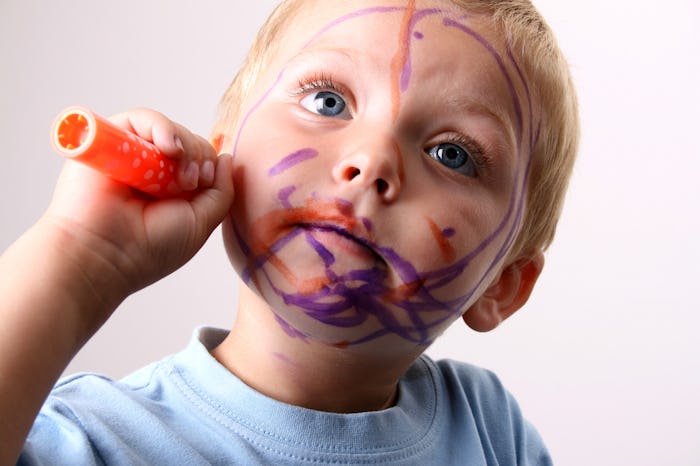Life

7 Things You Shouldn't Do If Your Child Is Misbehaving & Acting Like An A-Hole
When kids misbehave, it's easy to get worked up and react in a way that may only exacerbate the problem or cause issues in the long run. It happens to the best of us. But no matter how frustrated you may be, there are some things you should never do to get your child to behave, even if they are acting like the biggest little a-hole on the planet.
With two toddlers, behavior is something that I'm constantly struggling to address. Whether it's a bad or good day with the kids, I always wonder if I'm using the right tactics when it comes to discipline and getting them to listen. One of the many things that runs through my mind is how I can do better in guiding my children's behavior. More importantly, what are the things I should avoid as my children's behavioral example?
When I know what tactics I need to avoid, it helps me deal with my children's behavior much better, especially when I've hit a brick wall for the day. It also makes me feel confident that I'm utilizing positive parenting tactics when I can weed out the negative. So when it comes to enforcing proper behavior with your kids, here a few actions you'll want to nix.
1Send Them To Timeout
According to PBS, decades of neuroscience and social research show that timeouts are ineffective in steering the behavior of children and potentially outright damaging. Additionally, there are a few other negative things you're teaching your kids with timeout, like refusal to communicate, resentment, mistrust, and more.
2Yell At Them
Clinical psychologist Dr. Deema Sihweil told The National that yelling at your kids can have major negative effects on their psychological health. Children perceive yelling as a threat and also feel fundamentally responsible for their parents' anger, according to Sihweil. Long-term, yelling can cause issues like fear, stress, anxiety, insomnia, developmental delays, behavior issues, social difficulties, emotional issues, and more.
3Give A Spanking
Spanking tends to get a lot of mixed reviews. On the one hand, the site for Boston Children's Hospital noted that spanking may stop a child then and there, but there’s an emotional and cognitive cost. The site added that in the long run, it doesn’t usually teach the child not to repeat the behavior. On the other hand, research also suggests that moderate spanking has no effect on kids' overall well-being, according to Parenting. Either way, it's still not the best or most effective tactic to get your child to behave – employing more positive methods is a better route.
4Use Negative Labels
Telling your child, for example, that his behavior is "horrible" or he's "bad" can create a negative self-image, according to PopSugar. Imagine a peer saying something similar to you; then, think about how much more hurtful it might be to a child from their parent. Instead, consider removing harsh words and asking things like "Was that kind?" or "Are you being respectful?"
5Give Attention To Negative Behavior
It's important to not add fuel to behavioral fires because often kids are just seeking attention, even if it's negative. According to Centers for Disease Control and Prevention (CDC), parents should practice ignoring children in situations where they're using bad behavior to gain attention. This often includes things like tantrums, whining, and interrupting.
6Over Control
My mother was very controlling throughout my childhood, so I can speak to overbearing personality. Although intentions were clearly good, I can now see it often led me to lash out and misbehave in order to gain back freedom of my own. According to Independent, being too controlling can have long-term negative psychological effects and impact well-being. The site noted there are instances where children need to make their own decisions and mistakes in order to grow on a social and behavioral level, which means parents should practice support without always stepping in to take the wheel.
7Give Any Punishment Whatsoever
According to The Atlantic, there is an idea presented by the director of Yale Parenting Center Alan Kazdin that nixes punishment totally. Kazdin believes that punishment won't change a child's behavior. Instead, he suggested parents positively reinforce behavior they want to see until negative behavior dissipates.